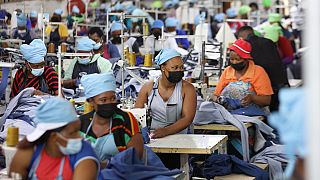Lesotho
When the coronavirus pandemic hit the world two years ago, the global fashion industry in Lesotho South Africa was not spared. Faced with collapsing demand, brands canceled orders worth billions of dollars as the tens of thousands of workers lost their jobs.
Two years into the coronavirus pandemic, the effects of the outbreak on the fashion industry remain substantial. In Lesotho, a mountainous speck of a country nestled entirely inside South Africa, the pain was especially widespread. Many people who lost their jobs due to the pandemic are making a comeback. Walking towards the blue jean factory in the industrial district of Lesotho's capital, Maseru, 32 -year-old Vekile Sesha who was forced to pack her bags and leave four months earlier, is willing to try her luck joining a queu of more than 100 job seekers. "We are a big crowd here, how can they call out individuals' names, while the rest of us stand here? Even when the person they call out isn't here, they won't take anyone else to fill their spot," she said, outside the blue aluminium shell of a factory that supplies pants and athletic shirts to American chain stores.
Although small in comparison to global garment-making giants such as Bangladesh and China, Lesotho's clothing industry is the country's largest private employer, and more than 80% of its workers are women, according to government officials.
In 2001, Lesotho signed on to a historic American trade deal: the African Growth and Opportunities Act, which guaranteed its duty-free imports to the U.S. of clothing manufactured in the country.
Molise Ramaili, Advocate and Chief Executive Officer of Lesotho National Development Corporation reacted to the impact of covid 19 in the company and the challenges they face with regard to workers. "They were paid their monthly salaries through the LNDC (Lesotho National Development Corporation) just to try retain them and try to ensure that the factories would recover from the pandemic, but unfortunately it took longer than it was anticipated by the whole world and ultimately some of them had to retrench."
In May 2021, workers were desperate, and local unions organized a strike to raise the garment sector's monthly minimum wage as some struggled to keep their jobs amid retrenchments.
Mabuta Irene Kheoane, factory worker, clung to her job, trying to work harder and faster to avoid being the next worker let go. The mother of an 11-year-old son, wishes the best for him and would not like him to go through the same situation as her in the future. "Lockdown made the already-difficult situation even harder because we couldn't leave our homes to go and look for work. I was without work when the lockdown kicked in and the restrictions on movement meant I had to go without food," she said.
Experts are uncertain about the garment industry's future - both in Lesotho and globally. It's unclear whether the industry will find ways to cushion workers or will continue its race to the cheapest possible production.













01:05
Lesotho declares two-year state of disaster amid US tariff fallout
Go to video
What to know about the COVID variant that may cause 'razor blade' sore throats
Go to video
WHO approves landmark pandemic agreement to improve response in event of future pandemic
Go to video
Nigeria completes $3.4 Billion IMF COVID-19 loan repayment, faces ongoing annual charges
01:02
WHO member countries draft landmark preparedness treaty for next pandemic
Go to video
Mauritius: Ex-finance minister released on bail after corruption charges